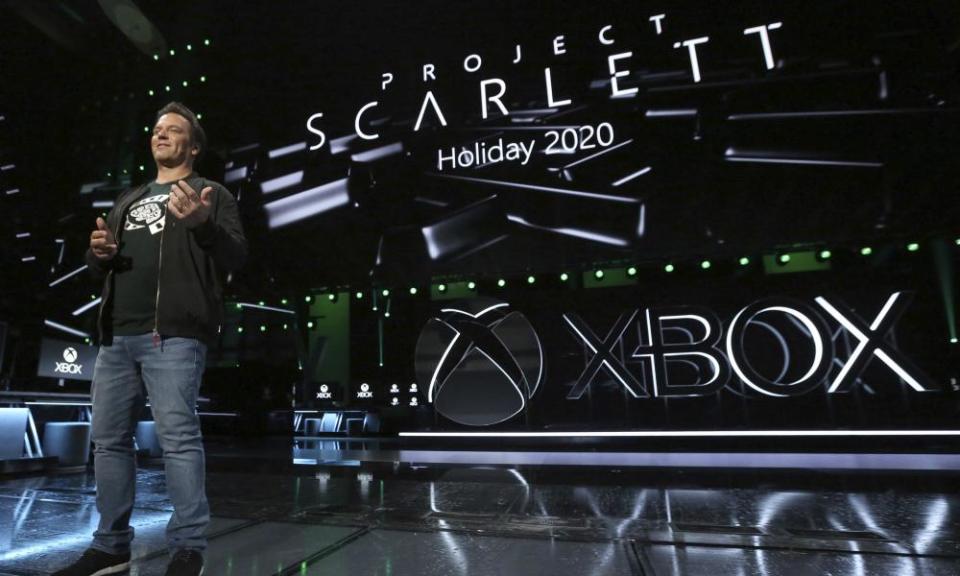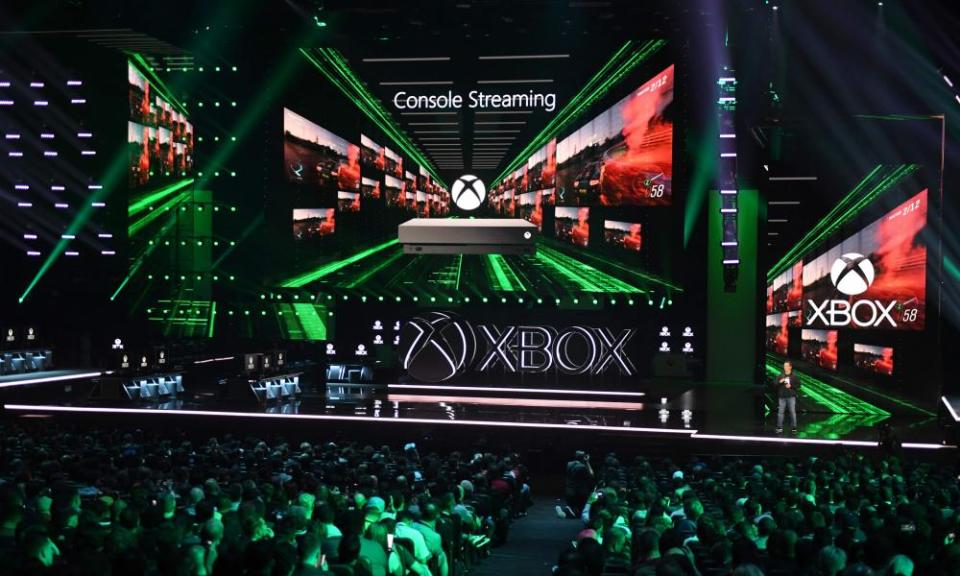Xbox chief: 'We discussed whether we should even do another console'

At the end of every video game console generation, the industry reaches a crossroads in relation to its future. This year, however, that point feels more like some kind of spaghetti junction. Sony and Microsoft have new machines coming out in 2020: the PS5, and the Xbox One follow-up known as Project Scarlett. Both companies have subscription-based services running on their current machines, and Microsoft is pitching its xCloud game streaming platform against the recently launched Google Stadia, both of which allow users to play console-quality games on a variety of devices without having to actually own a console.
So what is the future of gaming? Will it continue to feature increasingly powerful consoles and PCs that you have to replace every few years? Or will they be jettisoned in favour of streaming services that enable the games to be played on anything with a screen?
If anyone should know, it’s Phil Spencer, head of Xbox at Microsoft. Since his appointment in 2014, he has pushed a “gamer first” agenda, prioritising the experience and culture of games over business or technology speak. Now reporting directly to Microsoft CEO Satya Nadella, Spencer shares many of the same concerns about diversity and accessibility as his boss. But one thing is clear – he really believes in this medium.
Related: Xbox chief: we need to create a Netflix of video games
“I am biased, but video games are the best form of art out there,” he says. “It sounds flippant for me to say that as the head of Xbox, but I believe it. I believe in the unifying power of play. It’s the reason I’m in this job.”
After presenting a range of new blockbuster titles at the X019 fan event in London last week, the first game Spencer wants to talk about is Tell Me Why, a comparatively modest adventure from French studio Dontnod, which has a trans man as one of its two lead characters.
“It challenges us,” says Spencer. “Like, what does it mean for us to tell that story? We probably won’t get everything right, but I love taking that step. Gaming has a unique ability to bring people together. It’s a shared experience. We can save the world from the aliens together without being judged based on what we look like, how much money we have, where we come from, what political affiliation we have, what gender we are. I think that the game stories are going to start bringing that to life.”
So where does he stand on the issue of the day – game streaming v game hardware? Given the development of console-free technology, was there always going to be a successor to Xbox One?
“When we created Project Scarlett, and it was years ago that we started, we had the discussion as a leadership team: should we do another console?” he says. “Forget about streaming for a second – do we think there is a design point that matters beyond what Xbox One is capable of today? When we designed Xbox One X, we said we wanted to bring in true 4k Gaming. Do we think there’s something to design for that’s beyond that? We do. And we found that with Project Scarlett.”
The forthcoming machine sounds impressive technically, with its custom AMD Zen 2 processor promising four times the power of Xbox One X, AMD Navi graphics processor, built-in SSD and support for 8k displays. But Spencer says it’s not just about improving the visuals.

“One of the things we’ve really focused on with Scarlett is how games feel,” he says. “It’s not just feel in terms of input, though that is a big focus, but also, how long does it take me to get into a game? CPU capability is a part of that. Current gen consoles are like arm wrestlers – they have one big arm, which is the GPU, and one little arm, which is the CPU. When those things are more balanced, it will allow us to provide a better game feel through frame rate consistency and lower input latency. But I also think that can transfer through to the emotional feel we get in game. As you remove some of the ‘noise’ that we have to block out when we’re playing a game, developers will be able to use that sense of immersion to drive ever thoughtful storytelling.”
For Spencer, storytelling sits at the heart of emerging technologies such as game streaming. When talking about xCloud – in a testing phase with an invite-only beta programme and no word yet on how people will pay to use it – Spencer wants to highlight how the service will benefit developers and the games they make. For the last five years, studios have faced exponentially greater development costs, without being able to grow their revenues from straightforward game purchases. Many have started to think of “games as a service”, adding downloadable content, season passes and microtransactions to their titles, which don’t work as well with single-player narrative games and are controversial with players.
Supporting games from Africa or India is a great opportunity for us to tell new stories.
Spencer believes the new era of subscription and streaming services could help solve all this, partly because there’s now a whole strata of companies with money to spend on gaining exclusive content for their services. “As development costs increase, publishers have to find ways to recoup that investment, because your misses cost you more and the hits then need to cover those losses, plus turn a profit,” he says. “I talked to many of my friends in the development industry and, with us and Apple and Epic and Google Stadia all signing deals to get content, they can almost cover the costs of the development before they launch. They can really focus on building the game. And with something such as Game Pass, once the game gets launched, millions and millions of people are going to get to play it.”
One interesting element of xCloud is that it opens up a massive new global market for Xbox games. Microsoft recently revealed that the service will launch in India in 2020, a market where console sales have always been low, but where there are 300m gamers, mostly playing on smartphones. Spencer also talks about the possibility of launching in Africa. “I was there in April, and we opened two African development centres,” he says. “There are 1.2 billion people on the continent and the average age is 19. For the games industry, it’s just a pure growth opportunity.” It’s also ripe for game creation, and Spencer visited studios in Kenya and Nigeria. He is keen for the next generation of narrative games to move beyond what he terms “a bunch of white guy stories”.
“It was interesting because they’re trying to figure what games they should build,” says Spencer. “What I was trying to tell them was, you don’t need to focus on where you are geographically, because your life experiences will come through in the games you build. You can build a story that is set on your continent, or you can just build a game through your own lens, your own life experience, and that will be different from what people would build in other parts of the world. I think that’s a great thing in games – they allow you to live someone else’s life. That is unique to our art form. [Supporting] games from Africa or India is a great opportunity for us to tell new stories with lead characters we’ve never seen in gaming before.”
It seems as if both xCloud and Game Pass – a subscription service that lets Xbox One owners download a large number of games for one monthly fee – will fulfil a range of roles in the future. Spencer hints that instantly playable demos of new and forthcoming games might be available directly from the Scarlett home menu, via xCloud servers. “We’re doing work to make it as seamless as possible to click on a game icon and be able to play,” he says. “The time it takes from discovery of a game to actually playing it is one of the challenges we have relative to, say, video or music, where you can be in a service and looking around and trial very quickly. That’s an area where xCloud can add a ton of capability – even if, in the end, you buy the game, we can give you a taster of what it is very quickly.”
Spencer hints that the Game Pass and xCloud services will align, allowing Game Pass subscribers to stream the games they have downloaded and play them on other devices. There is room, too, for other subscription services within the same package. “We’ll also look more and more at how we can help other subscriptions, as well as our customers, by maybe landing subscriptions inside Game Pass,” says Spencer. “You might have seen the promotion we did with Spotify [which provided Game Pass subscribers six-months of Spotify access for no extra charge]. I think you’ll see us do more of that.”
So, according to Spencer, it seems the near future will see a range of complimentary streaming and subscription services, but at the heart of it, there will still be a specialist console.
“The best way for you to play in your home – today, tomorrow, next year – is going to be on a local piece of hardware,” he says. “That doesn’t mean that there’s not a future in cloud. Right now, xCloud is in preview, because we don’t think we’ve figured out all the answers to what cloud gaming is about, and we don’t want to try to get people to buy into the unknown. But we’re a big company. We can support the unknown. We will evolve.”

 Yahoo Finance
Yahoo Finance 